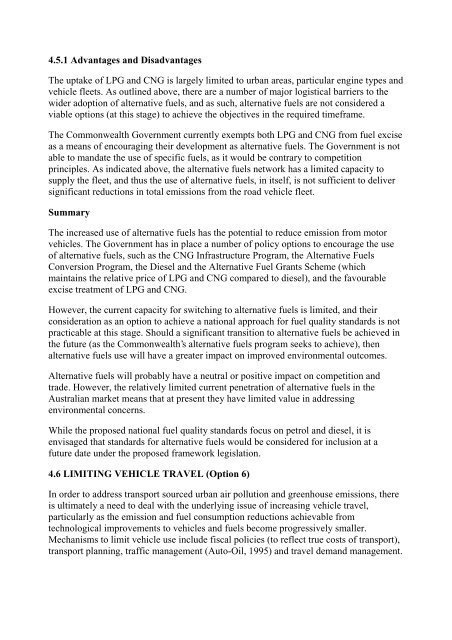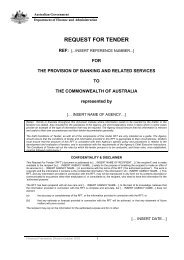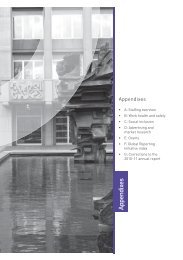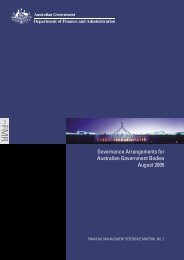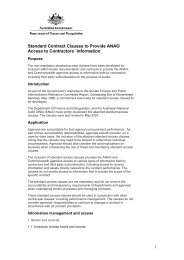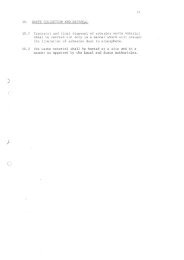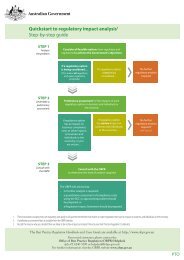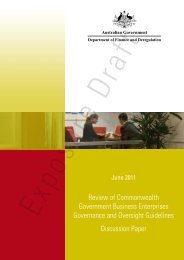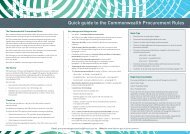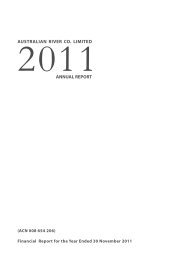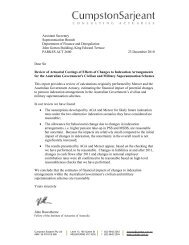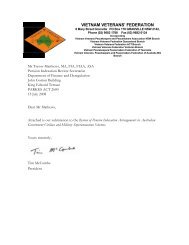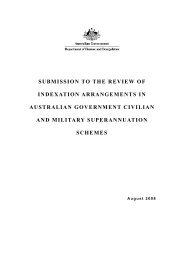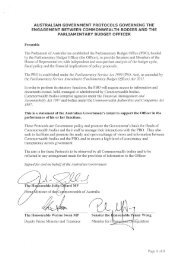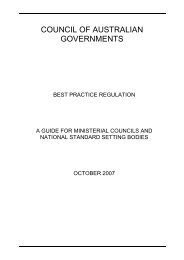National Fuel Quality Standards Regulation Impact Statement 1 ...
National Fuel Quality Standards Regulation Impact Statement 1 ...
National Fuel Quality Standards Regulation Impact Statement 1 ...
Create successful ePaper yourself
Turn your PDF publications into a flip-book with our unique Google optimized e-Paper software.
4.5.1 Advantages and Disadvantages<br />
The uptake of LPG and CNG is largely limited to urban areas, particular engine types and<br />
vehicle fleets. As outlined above, there are a number of major logistical barriers to the<br />
wider adoption of alternative fuels, and as such, alternative fuels are not considered a<br />
viable options (at this stage) to achieve the objectives in the required timeframe.<br />
The Commonwealth Government currently exempts both LPG and CNG from fuel excise<br />
as a means of encouraging their development as alternative fuels. The Government is not<br />
able to mandate the use of specific fuels, as it would be contrary to competition<br />
principles. As indicated above, the alternative fuels network has a limited capacity to<br />
supply the fleet, and thus the use of alternative fuels, in itself, is not sufficient to deliver<br />
significant reductions in total emissions from the road vehicle fleet.<br />
Summary<br />
The increased use of alternative fuels has the potential to reduce emission from motor<br />
vehicles. The Government has in place a number of policy options to encourage the use<br />
of alternative fuels, such as the CNG Infrastructure Program, the Alternative <strong>Fuel</strong>s<br />
Conversion Program, the Diesel and the Alternative <strong>Fuel</strong> Grants Scheme (which<br />
maintains the relative price of LPG and CNG compared to diesel), and the favourable<br />
excise treatment of LPG and CNG.<br />
However, the current capacity for switching to alternative fuels is limited, and their<br />
consideration as an option to achieve a national approach for fuel quality standards is not<br />
practicable at this stage. Should a significant transition to alternative fuels be achieved in<br />
the future (as the Commonwealth’s alternative fuels program seeks to achieve), then<br />
alternative fuels use will have a greater impact on improved environmental outcomes.<br />
Alternative fuels will probably have a neutral or positive impact on competition and<br />
trade. However, the relatively limited current penetration of alternative fuels in the<br />
Australian market means that at present they have limited value in addressing<br />
environmental concerns.<br />
While the proposed national fuel quality standards focus on petrol and diesel, it is<br />
envisaged that standards for alternative fuels would be considered for inclusion at a<br />
future date under the proposed framework legislation.<br />
4.6 LIMITING VEHICLE TRAVEL (Option 6)<br />
In order to address transport sourced urban air pollution and greenhouse emissions, there<br />
is ultimately a need to deal with the underlying issue of increasing vehicle travel,<br />
particularly as the emission and fuel consumption reductions achievable from<br />
technological improvements to vehicles and fuels become progressively smaller.<br />
Mechanisms to limit vehicle use include fiscal policies (to reflect true costs of transport),<br />
transport planning, traffic management (Auto-Oil, 1995) and travel demand management.


